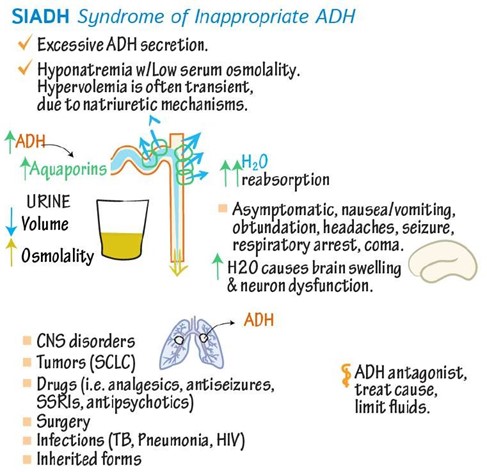Which is the hormone that stimulates the release of aldosterone from the adrenal cortex.
Renin.
Angiotensin I.
Angiotensin II.
Antidiuretic hormone (ADH).
The Correct Answer is C
Angiotensin II is a hormone that stimulates the adrenal cortex to release aldosterone. Aldosterone is a hormone that helps regulate blood pressure by increasing the reabsorption of sodium and water and the excretion of potassium by the kidneys.
Choice A is wrong because renin is not a hormone but an enzyme that catalyzes the conversion of angiotensinogen to angiotensin I1.
Choice B is wrong because angiotensin I is an inactive precursor of angiotensin II that is converted by angiotensin-converting enzyme (ACE) in the lungs.
Choice D is wrong because antidiuretic hormone (ADH) is a hormone that regulates water balance by increasing the reabsorption of water by the kidneys, but it does not affect aldosterone secretion.
Nursing Test Bank
Naxlex Comprehensive Predictor Exams
Related Questions
Correct Answer is B
Explanation
This is a priority nursing intervention for a client with acute kidney injury (AKI) because it helps to assess the renal function and fluid status of the client. Urine output is also an indicator of the response to treatment and the need for further interventions.
Choice A is wrong because pain medication is not a priority intervention for AKI unless the client has other conditions that cause pain.
Pain medication may also have adverse effects on the kidney function and should be used with caution.
Choice C is wrong because ambulation is not a priority intervention for AKI and may not be appropriate for a client who is fluid overloaded or hypotensive.
Ambulation may also increase the risk of falls and injury in a client who is confused or fatigued.
Choice D is wrong because assisting with meals is not a priority intervention for AKI and may not be necessary for a client who has adequate oral intake.
A client with AKI may also have dietary restrictions such as low protein, low potassium, low sodium, and low phosphorus, which should be considered when providing meals.
Correct Answer is A
Explanation

SIADH is a condition in which your body makes too much antidiuretic hormone (ADH), which controls how your body releases and conserves water.
SIADH makes it harder for your kidneys to release water and causes the levels of electrolytes, like sodium, to fall due to water retention.
This leads to hyponatremia, which is when you have low levels of sodium in your blood.
Choice B is wrong because hypernatremia is when you have high levels of sodium in your blood.
This can occur due to dehydration, excessive salt intake, or kidney problems.
Choice C is wrong because hyperkalemia is when you have high levels of potassium in your blood.
This can occur due to kidney failure, acidosis, or certain medications.
Choice D is wrong because hypokalemia is when you have low levels of potassium in your blood.
This can occur due to vomiting, diarrhea, diuretics, or alkalosis.
Whether you are a student looking to ace your exams or a practicing nurse seeking to enhance your expertise , our nursing education contents will empower you with the confidence and competence to make a difference in the lives of patients and become a respected leader in the healthcare field.
Visit Naxlex, invest in your future and unlock endless possibilities with our unparalleled nursing education contents today
Report Wrong Answer on the Current Question
Do you disagree with the answer? If yes, what is your expected answer? Explain.
Kindly be descriptive with the issue you are facing.
